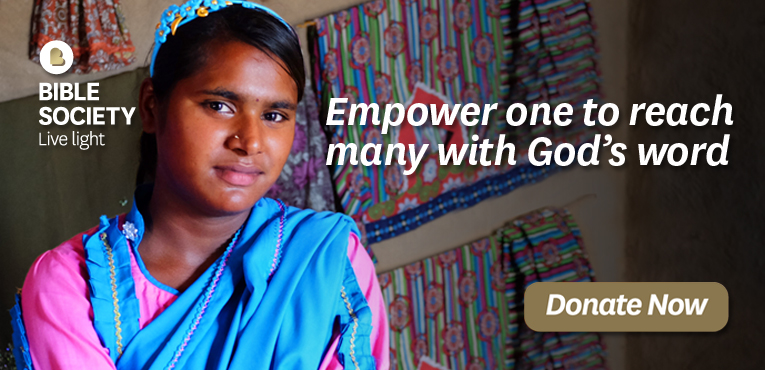The streets of Pakistan teem with rickshaws, ox carts, donkey carts, motorbikes and trucks, all weaving between lanes, leaving the slenderest of margins, while blasting their horn. I feel worried as our minivan almost clips a boy carrying a heavy load of boxes on a motorbike, but instead we roar past, overtaking a rusty bus with passengers squashed against the windows like sardines.
I am travelling at speed through the Bahawalpur District, in Punjab, a rich and green area of five rivers dotted with date palms, cotton fields and eucalypts imported from Australia. I am on my way to meet Sahana and Arati*, new Christians who are bringing the light of God’s word into their family and their mainly Hindu village thanks to Pakistan Bible Society’s Adult Literacy Programme.
There is no road to this village of mud huts, built on a tributary of one of the many canals constructed to divert water from the rivers, so we walk for about half a kilometre through a cotton field to reach it.
With no electricity and no running water, Sahana and Arati’s lives are harsh. But their attitude is extraordinary. They speak fervently of the light that has shone on their village as a result of the Literacy Programme, funded primarily by donors from Australia.
Before she learned to read, Arati worked tirelessly under a hot sun picking cotton to earn just $1 a day. As a low-caste Hindu, she had little status and her life was a daily grind. As soon as she could read, she realised that the cotton buyers were cheating her by knocking off a few kilos from her weighed cotton.
“When they weighed the cotton, I believed what they said,” Arati explains. “But after studying I read the scales and I knew the actual weight and now the men can’t cheat us.”
But the beacon of literacy has changed Arati’s life in an even more powerful way. Through reading the Bible, she has learned of Jesus’ sacrificial love and found acceptance in God’s family.
“Jesus died for us, and there’s no one in the world who has died and risen again. We appreciate this love,” she says.
Arati credits her big sister Sahana with sparking her desire to read the Bible. She says the whole family noticed a great change in Sahana when she returned to the village after living with a Christian family for three years in a nearby city. Through attending church with them she came to trust in “the alive God” and on her return shared her faith with family members, neighbours and friends.
“When Sahana came back she was different,” says Arati. “When she prayed early in the morning we had no idea what she was doing. We thought it might be a magical charm. Then Sahana explained to us about Christianity. We were touched by the love shared with us by Christians, so the whole family converted to believe in Jesus.”
Through their Christian witness seven of the 200 families in the village have now become Christian too. And their elder brother, who once mocked their Christian faith, and wouldn’t allow them to sing songs or pray in the home, is studying to be a pastor.
“There is a big change in our village since the start of literacy classes in our village,” Arati says. “We are very happy and our families are also very happy.”
After our interview, Arati and Sahana take me through the warren of dusty lanes to a colourful marquee, where 60 or so women in vivid dresses from about 15 surrounding villages have gathered to celebrate their graduation from the literacy programme.
The average age here is only about 20 but most are already married with a couple of kids and burdened with domestic responsibilities. Their success in the six-month course has not come easily and has required courage in the face of opposition, as a lively skit demonstrates.
Arati puts glasses halfway down her nose and sits on a chair to play the part of a mother who blocks her daughter from going to literacy class by keeping her at home to do the sweeping, the cooking and all the other domestic chores.
“What do you want to be educated for anyway?” a rich lady objects. “What’s the point? You’re only going to end up a servant!”
Another young woman sways on to the scene acting as the drunken brother demanding money for more alcohol, and when “he” discovers there is none, demands his sister hand over the household gods to sell for drink.
As the daughter tries to placate her brother, a teacher (played by Sahana) explains that if the daughter attends her free adult literacy class, life will improve for the whole family. They will fight less and have more respect for each other. And when anyone falls sick the daughter will able to read the label on the medicine.
After the skit it’s time for Anthony Lamuel, general secretary of Pakistan Bible Society, to hand out certificates and large-print Urdu Bibles to the teachers to give to their students. It is a time of hilarity and celebration as these women hoist their heavy load of precious Bibles.
As we are leaving, a female literacy teacher rushes up and hands me a note signed by a male teacher called Haroon. In it he pleads for the adult literacy programme to continue because “there are many more illiterate women” in this area.
Email This Story
Why not send this to a friend?


